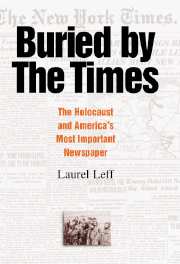Book contents
- Frontmatter
- Dedication
- Contents
- Acknowledgments
- Note Abbreviations
- Introduction: “Last Voice from the Abyss”
- PART I 1933—1941
- 1 “Not a Jewish Problem”: The Publisher's Perspective on the Nazis' Rise and the Refugee Crisis
- 2 “This Here Is Germany”: Reporting from the Berlin Bureau
- 3 “Worthy of France”: The Vichy Government's Anti-Semitic Laws and Concentration Camps
- 4 “A New Life in Nazi-Built Ghettos”: German Domination of Poland, Rumania, and the Baltic States
- PART II 1942—1945
- Conclusion: “The Horrible Story Was Not Told”
- Appendix A Key Individuals
- Appendix B Key Institutions
- Appendix C List of Front-Page Stories
- Notes
- Index
3 - “Worthy of France”: The Vichy Government's Anti-Semitic Laws and Concentration Camps
Published online by Cambridge University Press: 05 February 2015
- Frontmatter
- Dedication
- Contents
- Acknowledgments
- Note Abbreviations
- Introduction: “Last Voice from the Abyss”
- PART I 1933—1941
- 1 “Not a Jewish Problem”: The Publisher's Perspective on the Nazis' Rise and the Refugee Crisis
- 2 “This Here Is Germany”: Reporting from the Berlin Bureau
- 3 “Worthy of France”: The Vichy Government's Anti-Semitic Laws and Concentration Camps
- 4 “A New Life in Nazi-Built Ghettos”: German Domination of Poland, Rumania, and the Baltic States
- PART II 1942—1945
- Conclusion: “The Horrible Story Was Not Told”
- Appendix A Key Individuals
- Appendix B Key Institutions
- Appendix C List of Front-Page Stories
- Notes
- Index
Summary
Editors at the New York Times first learned that 7,000 Jews from Baden and other western provinces of Germany had been sent to France not from the Times' three reporters in Berlin. Nor did the news come from the Times' three reporters in France. It came from Arthur Sulzberger's cousin.
By the summer of 1940, Fritz Sulzberger, who had sought Arthur's help in immigrating to America, had settled in Southbridge, a small town in Massachusetts, and was again practicing medicine. His wife and two children were with him, but he had left his 68-year-old mother, Bertha, in Karlsruhe in the province of Baden. In October 1940, Fritz read in another newspaper that all the Jews in Baden had been deported to France. “As my mother is living in Baden you can imagine how worried I am,” he wrote his cousin Arthur, whom he then asked to help obtain more information. Arthur responded that he was not sure he could help. “Some time ago, when we asked our office to make inquiries, we got word back that the government frowned on our using our bureau for any reason other than for legitimate news purposes,” he wrote Fritz. “However, I shall see what can be done. If we cannot reach your mother specifically it's possible that we can find out if the Baden story is true.”
- Type
- Chapter
- Information
- Buried by the TimesThe Holocaust and America's Most Important Newspaper, pp. 77 - 106Publisher: Cambridge University PressPrint publication year: 2005



